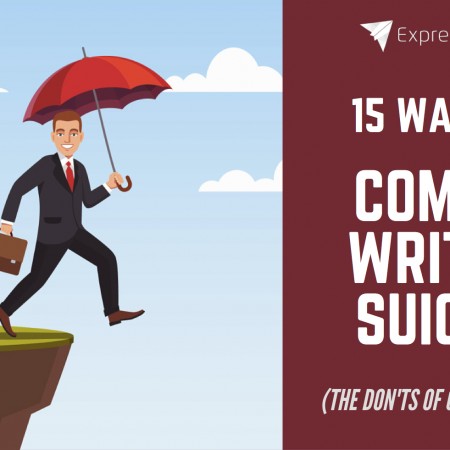25 Errors in Your Online Writing that Could Be Costing You Money
When it comes to your online writing, there are a few mistakes you just don’t want to make. From disorganized structure to spelling and grammar mistakes, some things will sink your copy faster than the Titanic. Online copywriting is a learned skill; that’s why you should know what not to avoid just as much as what you should do. And some critical errors WILL cost you money—whether that’s conversion, visitor amounts, or higher bounce rates. Here’s our key list. 25 Horrible, No-Good Errors to Avoid Making in Online Writing That Will Cost You Money Avoid these 25 major content errors in order to create online copy you’ll be proud of. 1. An unclear objective Imagine trying to drive to Florida if you didn’t even know which side of the country it was on. You’d likely wander around aimlessly until you (or your fellow passengers) got frustrated and gave up. In life as in writing, it’s impossible to wind up where you want to be if you don’t know where you’re going. With this in mind, it’s imperative to define an objective for your writing and ensure that each word of each sentence of each post is working to achieve it. This provides a quality experience for your readers and helps you create a valuable piece of content for your brand. 2. No defined target audiences Just like it’s impossible to figure out where you’re going without a clear end address, it’s impossible to write valuable, productive content to a particular group if you don’t know who you’re speaking to. Defining a target audience is one of the most important aspects of online content creation. In addition to allowing you to hone your voice and come up with interesting and valuable topics, your target audience also helps inform your writing and allows you to gauge your success therein. 3. Online writing without a purpose What do you want this piece of article/blog post/Facebook update to do? Is it mean to educate your audience? Drive them to purchase something? Drive them to click on something? Remember WHERE (platform) it’s for, and WHO (audience type) it’s for. (For a guide on content lengths, check out our infographic.) No matter what the purpose of your writing may be, it’s important to move toward it with a single-minded focus throughout your writing. In addition to helping you structure your content, ensuring that you’re writing with the goal you want your readers to take in mind can help you ensure you’re getting the conversions you deserve. 4. Unclear organization (burying the lead) If your readers can’t determine what’s important and what’s not within your copy, you’re sunk. Because of this, it’s imperative to ensure that the biggest ideas, topics, or takeaways in your content get a front-and-center seat. Be sure to break these thoughts up and outline them further with headings, subheadings, lists, and bullet points. 5. Lengthy, unbroken body content While long-form content is all well and good, one continuous stream of content (Jack Kerouac’s On the Road style) isn’t. While stream-of-consciousness writing may have worked for some literary gurus, it doesn’t work for web copy. When you overwhelm people with too much information and not enough punctuation, paragraph breaks, or subheaders, they’re likely to stop reading immediately. Avoid this by breaking your body content into small chunks. This makes it easier to read, which has the potential to increase your conversions and traffic hugely. 6. Jargon Nobody likes jargon. Unless you’re speaking to a very high-level audience (writing a medical paper, for example) stick to using language that everyone can understand. Jargon is alienating, and not a great way to get people engaged with your content. Avoid it for higher conversions and more interest in your online copywriting. 7. Lack of credibility If you’re going to make a significant claim in your online writing, back it up. Readers are smart, and there are more than enough ways that they can out your phony claims or ill-researched topics. Avoid destroying your credibility and your reputation in one fell swoop by taking the time to research everything and fact check it before you publish your content. Doing this can help you avoid credibility missteps and ensure that you’re always providing quality, valuable content to your readers. 8. Distracting links While link building is an important trick of the trade, there are ways to use links incorrectly that often detract from your online writing. One of the most common mistakes people make with links is to use too many of them in content, creating a distracting environment that doesn’t allow readers to focus on your writing or ideas. Avoid this by using links sparingly and embedding links to sources and relevant ideas in anchor text. This provides value for the reader without becoming overwhelming. 9.Too many bells and whistles Just like too many links can distract your readers, so can too many images, ads, popups, or social sharing buttons. Avoid frustrating your readers and killing your page’s load time by paring your site and content down to only what is actually needed. This ensures a good user experience and keeps your site streamlined and functional, which allows the attention to funnel naturally to your content. 10.Relying too much on short and sweet While short content has its place in the world of online writing, multiple sources have found that long-form content converts better. This is particularly the case in cases of involved topics or in-depth discussions about niche news or developments. While long-form content (often defined as content longer than 1,000 words) typically takes more time and thought to create, it can help you build your presence online and establish yourself as a leader in your industry. 11. Being too casual While you want to incorporate a certain level of approachability into your writing, getting too relaxed can quickly turn readers off. There’s a fine line between friendly and approachable and downright unprofessional and crossing the latter will land you in hot water with your readers. To avoid this, be conversational … Read more

